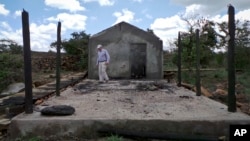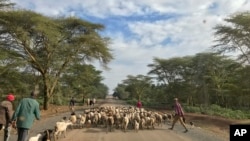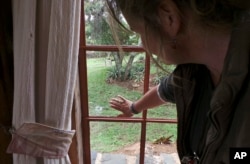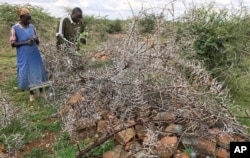Burned-out homes in this dry landscape have become a symbol of the tensions around Tuesday's presidential election as Kenyans prepare for the possibility of yet more deadly violence.
For more than a year now, farms and homes in Laikipia County have been under siege.
Farmer Martin Evans inspects one blackened home, the result of an invasion by semi-nomadic herders who say a widespread drought is making them desperate to find grazing land for their animals.
The severe drought affects half of Kenya's 47 counties and has been declared a national disaster. Watering holes and rivers are running dry. Crops are failing and livestock are dying, causing prices of some staple foods to jump by more than 30 percent.
"We don't stay long, we steal and run home,'' said one herder, Gimaru. Other herders refuse to leave, claiming rights to land their ancestors occupied before British colonial rule.
But many farmers say they believe the land invasions are politically motivated. They say some politicians are inciting the hundreds of herders to invade and displace thousands of farmers, both black and white, changing voter demographics to help win local elections.
In late July, Mathew Lempurkel, a member of parliament from Laikipia, was charged in a Nairobi court with inciting his constituents to violence and racial contempt. He is accused of making comments supporting the forceful eviction of white landowners if Kenya's top opposition leader Raila Odinga wins the presidential election. Lempurkel has denied the charges.
The race between Odinga and President Uhuru Kenyatta has narrowed, with one poll in the past week putting Odinga ahead by just 1 percentage point. As tensions rise, some observers are warning of violence and recalling the post-election chaos a decade ago that left more than 1,000 dead.
A government report in 2013 on the violence found that politicians often exploit real or perceived land injustices around election time for personal gain. Complicated grievances can last decades in Kenya where traditional land claims often conflict with those made during the years of British rule.
In Laikipia, Kenya's military and police have been working to disarm and drive hundreds of herders and their animals out of ranches that have been invaded, but the authorities' actions appear to have escalated the violence.
Herders in recent months have killed a British safari guide and conservationist, Tristan Voorspuy, and shot well-known Italian author Kuki Gallman in the stomach. More than 30 people have died since late last year.
Maria Dodds, a livestock breeder, says her property has been attacked every few days for almost a year.
"The damage that has been done to this farm is unbelievable. Boreholes have been destroyed, generators, staff housing, 34 kilometers (21 miles) of electric fence have been destroyed,'' she says. Almost half of her employees have fled.
The attacks are not limited to white ranchers.
In November, Emuria Lorere lost his brother to armed herders. Emathe Nangula was killed and his 42 goats and sheep were stolen.
"He was a very good man. In fact, the family has missed him,'' Lorere says.
Simon Eturen, head of security at the ranch where Voorspuy was killed earlier this year, now walks around with a firearm.
Laikipia is also home to varied wildlife. Eturen has been working at the ranch for 12 years and says he has never seen so many animals killed as in recent months. The executive director of the Laikipia Wildlife Forum, Peter Hetz, has no numbers of wildlife killed but says they have seen "wanton killing'' by herders.
"If you look closely it is just politically instigated,'' Eturen says. "When you meet these people they tell you that politicians have told them that they will get the ranches for free for them to graze their animals'' and claim the land's lease to the "white man'' has ended.







